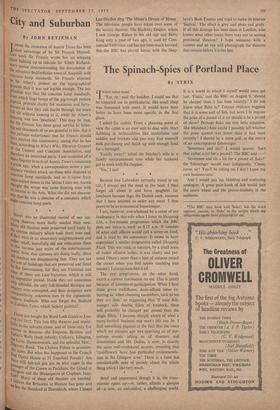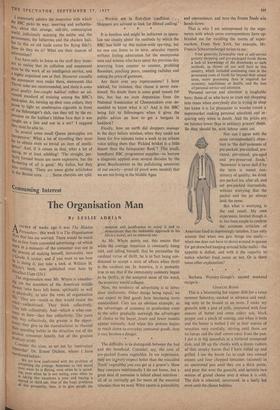The Spinach-Spies of Portland Place
By STRIX LTWANT some meat.'
I 'Yes, sir,' said the butcher. I could see that he expected me to particularise. His small shop was festooned with meat. It would have been better to have been more specific in the first place.
I asked for cutlets. From a planning point of view the cutlet is art easy unit to deal with. Start dabbling in technicalities like tenderloins and saddles and briskets and you may find yourself bulk-purchasing and finish up with enough food for a fortnight.
'Family away?' asked the butcher's wife in a faintly compassionate tone while her husband got to work with His chopper.
'Yes,' I said.
* * *
Because two Labradors normally travel in my car, I always put the meat in the boot. I then forget all about it and have spaghetti for luncheon because Inge, the Danish cook, assumes that I have omitted to order any meat. I thus prove to be an'economical housekeeper.
I am, however, overwhelmed by a sense of my inadequacy in this role when I listen to Shopping List, a five-minute programme which the BBC puts out twice a week at 8.15 a.m. It consists of what staff officers would call a sitrep on food, and is read by the announcer. It seems to have superseded a similar programme called Shopping Flash. This was read, in rotation, by a small team of rather effusive ladies; it was chatty and per- sonal ('there's more than a hint of autumn round the corner when you find apples tumbling into season'). I always switched it off.
The new programme, on the other hand, exerts a curious fascination on me. This is partly because of announcer-participation. When I hear those grave mellifluous, demi-official tones ex- horting us 'when choosing cucumbers, look to see they are firm,' or suggesting that 'if your fish- monger sells double fillets of haddock, these will probably be cheaper per pound than the single fillets,' I become sharply aware of what a many-faceted business one man's life can be. I find something piquant in the fact that the voice which ten minutes ago was apprising us of por- tentous events, telling us of disasters and detonations and Mr. Dulles, is now, in exactly the same well-modulated accents, revealing that 'cauliflowers have had particular recommenda- tion in the Glasgow area.' There is a faint but unmistakable note of parody about the whole thing which I like very much.
* * *
Brief and impersonal though it is, the trans- mission opens up—or, rather, affords a glimpse of—a new, an unfamiliar, a challenging world. It is a world in which I myself would soon get lost. 'Flake,' said the BBC on August 9, 'should be cheaper than it has been recently.' 1 do not know what flake is.* Textual evidence suggests that it is some sort of fish, but were I to inquire the price of a pound of it (or should it be a pound of them? Perhaps flake are tiny little creatures, like whitebait.) how could I possibly tell whether the price quoted was lower than it had been recently? I should be a mere gull, at the mercy of an unscrupulous fishmonger.
'Seventeen and six?' I would quaver. 'Isn't that rather a lot for a pound? The BBC said—' 'Seventeen and six a lot for a pound of flake!' the fishmonger would roar indignantly. 'Come, come, sir! You'll be telling me I don't know my own business next.'
And I would pay up, blushing and muttering apologies. A great pale hunk of fish would join the spare wheel and the grouse-feathers in the oubliette.
*The BBC may have said 'hake'; but the word appears, passim, as 'flake' in the scripts which my ubiquitoUs agents have procured for me. SPECTATOR, SEPTEMBER 27 Iimmensely admire the assurance with which the BBC picks its way, thunerring and authorita- tive, about this strange, still-life, cornucopian Word, judiciously quizzing the saithe and the flying fish?). Persimmons, the bilberries and the chicken hali- but (is this an old trade name for ?). How do they do it? What are their sources of information?
You have only to listen to the stuff they trans- mit to realise that its collation and assessment must be the work of an intelligence service, and a highly organised one at that. However casually the announcer may make them, statements like 0 1-1 ier soles are recommended, and there is some good quality line-caught halibut' reflect an ad- vanced standard of training among the BBC's food-spies. As, turning up their coat collars, they Pattie to light an unobtrusive cigarette in front of the fishmonger's slab, can they tell by the ex- pression on the halibut's lifeless face that it was caught on a line and not in a net? I suppose they must be able to. , `in several areas small Queen pineapples are inexpensive.' What a lot of travelling they must dO to obtain even so trivial an item of intelli- gence! And, if it comes to that, what a lot of or at least nibbling! 'The straight, per- fectly formed beans are more expensive, but the flavouring of all is good.' My italics, but they, irns nothing. 'There are some globe artichokes in the Bristol area. . Some cherries are split. . . . Prawns are in first-class condition. . . . Shoppers are advised to look for filleted codling.' It is bootless and might be indiscreet to specu- late too closely about the methods by which the BBC has built up this nation-wide spy-ring; but no one can listen to its terse, oracular reports without feeling admiration for the anonymous men and women who have spent the previous day scurrying from counter to counter, prodding• flounders, pinching pears, counting radishes and noting the price of gammon. Are there ever any repercussions? I have noticed, for instance, that cheese is never men- tioned. No doubt there is some good reason for this, but has no irate deputation from the National Association of Cheesemakers ever de- manded to know what it is? And is the BBC being fair to fishmongers when it gives the. public advice on how to get a bargain in haddock? Finally, how on earth did shoppers manage in the days before wireless, when they could not listen for five minutes twice a week to an urbane them a that 'Pick voice telling theled brisket is little dearer than the forequarter flank'? This small, beneficent BBC programme supplies—to borrow a diagnosis applied over several decades by the great Beachcomber to the pullulating amenities of our society—proof (if proof were needed) that we are not living in the-Middle Ages.

































 Previous page
Previous page